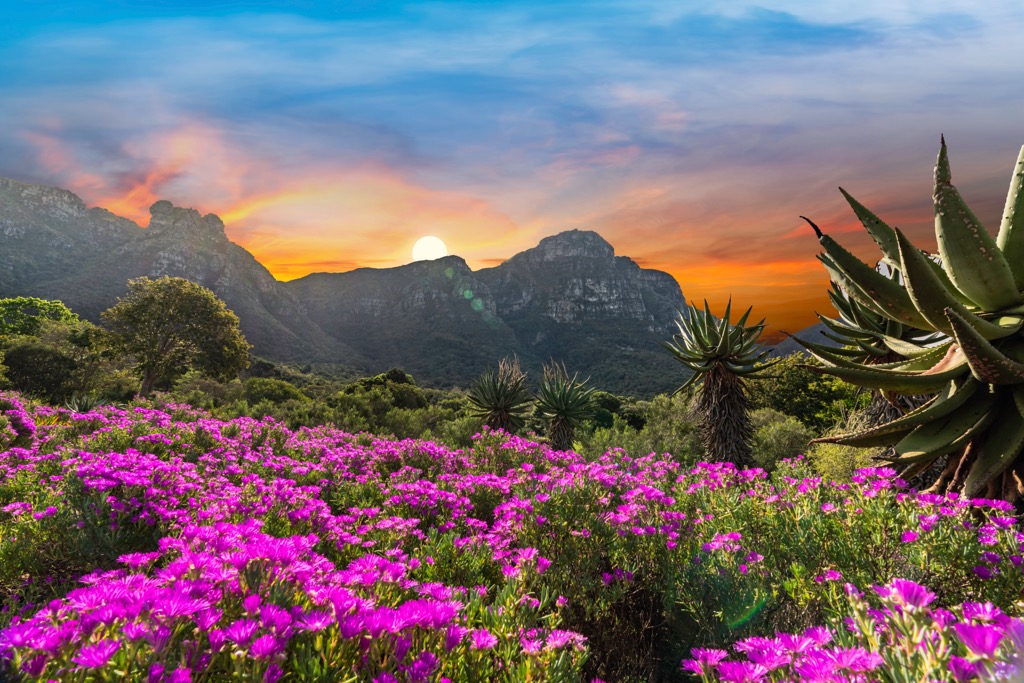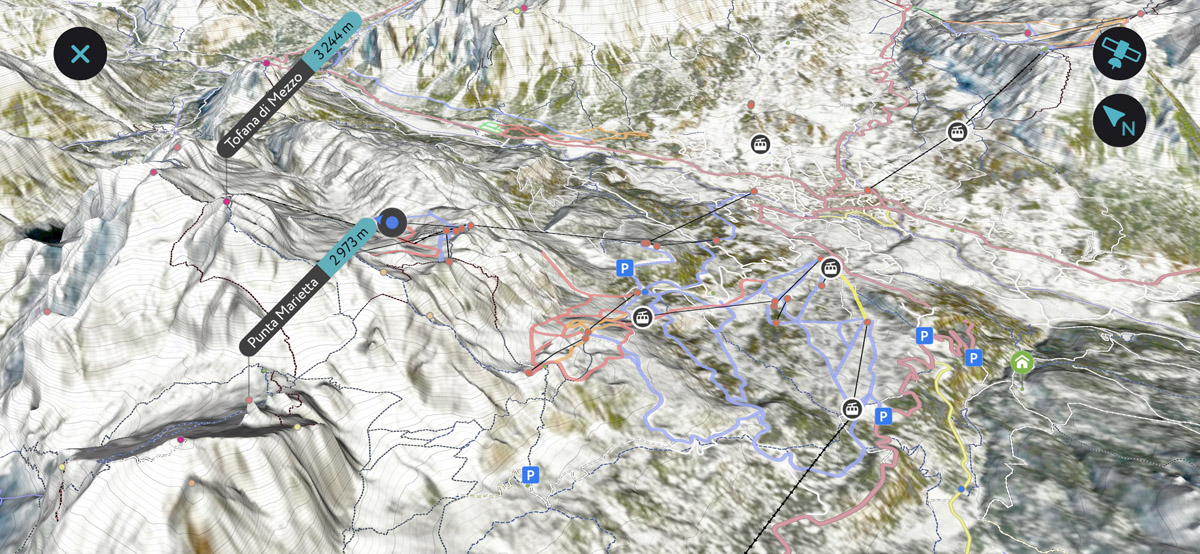Get PeakVisor App
Sign In
Search by GPS coordinates
- Latitude
- ° ' ''
- Longitude
- ° ' ''
- Units of Length

Yes
Cancel
❤ Wishlist ×
Choose
Delete
The Ceres Mountain Fynbos Nature Reserve is located in the Western Cape of South Africa and is renowned for its fertile land and scenic landscapes. There are 10 named mountains in Ceres Mountain Fynbos Nature Reserve; the highest and most prominent is the Mostertshoek Twins (South Peak), measuring 2,031 meters (6,663 ft).

The Ceres Mountain Fynbos Nature Reserve sprawls across an expansive area of approximately 3,000 ha (7,400 ac) within the Cederberg Mountains. The reserve is located in the Koue Bokkeveld region of the Western Cape, approximately 170 km (105 mi) northeast of Cape Town. Named after the Greek goddess of agriculture, Ceres, the reserve is renowned for its fruitful valleys and diverse ecosystems, namely its distinctive fynbos vegetation.
The plant life within the reserve is noteworthy, featuring mountain fynbos at higher elevations, displaying impressive adaptability to the rugged terrain. The lower slopes offer a transition to Karoo vegetation, characterized by hardy shrubs and succulents. Endemic species like proteas, ericas, and other vibrant flowers contribute to the ecological significance of the reserve.

Ceres is in the Cape Floral Kingdom, also known as the Cape Floristic Region, a UNESCO World Heritage Site. This region, found in the Western Cape province of South Africa, is acknowledged globally as a biodiversity hotspot. It is particularly famous for its diverse array of over 9,000 plant species, many exclusive to this area.
The reserve's landscape is dominated by Cedarberg Sandstone formations, featuring dramatic cliffs and rocky outcrops that have developed over millions of years. The elevation varies significantly, ranging from a minimum of about 262 meters (860 ft) to a maximum of 2,031 meters (6,663 ft). The average elevation is approximately 703 meters (2,306 ft), highlighting the diverse topography that plays a crucial role in the reserve's ecological diversity.

The Ceres Mountain Fynbos Nature Reserve forms part of the Cape Fold Belt, a series of mountains that formed about 360 million years ago due to tectonic forces. The reserve is composed mainly of sandstone and shale rocks belonging to the Table Mountain Group, a geological formation that includes the famous Table Mountain in Cape Town.
The geology of the reserve can be divided into two main groups: the Cape Supergroup and the Karoo Supergroup. The Cape Supergroup was formed about 600 to 700 million years ago by a succession of sedimentation of sandstone composed of silt, mud, and sand. The distinct reddish color of the rock is a result of minerals like iron and manganese that formed part of the sediments.
Meanwhile, the Karoo Supergroup was deposited over the Cape Supergroup about 310 million years ago when the icy conditions subsided. It consists mainly of shale, sandstone, and carbon deposits like coal. Some of these carbon deposits have become extremely compacted over time, creating the diamonds that are one of South Africa’s economic engines.

The Ceres Mountain Fynbos Nature Reserve is in the Cape Floral Kingdom and is known for its unique Fynbos flora that has adapted remarkably to the challenging environment. One notable adaptation is the Proteoid Roots, specialized structures that enhance nutrient absorption in nutrient-poor soils.
While the reserve is primarily recognized for its diverse flora, it also supports noteworthy fauna. One prominent species is the Cape Sugarbird, acknowledged for its crucial role in pollinating the distinctive flora in the ecosystem. Notably, this bird can visit up to 300 flowers in a single day and is significant in the reproductive processes of indigenous plant species.

Many fynbos species in the Ceres Mountain Nature Reserve and beyond are endangered due to threats from invasive plants, urban expansion, and agricultural land conversion. Efforts to conserve the biodiversity of the Cape Floral Kingdom are underway, with the Fynbos region designated as a UNESCO World Heritage Site.

Various reserves have been established to protect the unique flora of this area. The World Wide Fund for Nature (WWF) is crucial in these conservation endeavors, actively supporting programs like the Cape Action for People and the Environment. Their commitment aims to ensure the preservation of the precious Fynbos habitat in the face of mounting challenges.

The Mosterthoek Twins Trail is a 19 km (12 mi) circular route known for its rocky scrambles and an elevation gain of 2,051 meters (6,729 ft). The trail features the isolated peaks of the Mostertshoek Twins, located at the western end of the Waaihoeksberge section of the Hex River Mountains. A long, narrow ridge connects these peaks to Waaihoekpiek and the broader mountain range.
The Mosterthoek Twins have dual summits, with the southern peak reaching 2,031 meters (6,663 ft) and the slightly lower northern summit at 1,954 meters (6,411 ft). The trek offers scenic views of Stoffel se Kop, Waaihoekpiek, and Pic Delville. At the base of the peaks, rock pinnacles add to the scenery.
The Ceres Peak Trail is an 8.7 km (5.4 mi) out-and-back trail known for its challenging terrain with steep gradients and loose rock. Despite being popular among visitors, hikers can enjoy solitude during quieter times of the day. The trail offers exceptional views from Ceres Peak, including sights of the town of Ceres, Koekedow Dam, and surrounding hills such as Slab Peak, Mount Formica, and Mitchell’s Pass.
The Pells Hut Hiking Trail spans approximately 8 km (5 mi) and presents a demanding out-and-back route with an elevation gain of 1,140 meters (3,740 ft). Views feature the peaks of Mosterthoek Twins (South Peak), Waaihoekpiek, Tarantula Peak, and Sybasberg.
The Ceres Koekedouw Dam Trail offers a scenic and moderately challenging hike. The trail is approximately 7 km (4.3 mi) and an elevation gain of 252 meters (826 ft). Notably, the trail is characterized by its well-marked and maintained path, ensuring accessibility for hikers. One of the highlights is the mountainous scenery of Ceres Peak, Mount Formica, and Stettyn.
Ceres is northeast of Cape Town and in the scenic Warmbokkeveld Valley. Despite its modest size, this charming and fertile town provides a range of activities and attractions for visitors to enjoy.
Mitchell’s Pass is the northeastern gateway to Ceres and unveils scenic vistas of the surrounding valleys and hills.

Ceres is a central hub for the seasonal production of fruits such as apples, pears, and peaches. A not-to-be-missed experience in Ceres involves picking fresh, locally grown fruits. The encompassing mountainous terrain offers abundant outdoor activities, including hiking, mountain biking, and the exploration of nature.

Located on the southwestern tip of South Africa, Cape Town is renowned for its rich cultural heritage, picturesque landscapes, and a plethora of activities to engage visitors. South Africa’s second-largest city boasts a cosmopolitan atmosphere and provides an array of attractions, from outdoor adventures to cultural landmarks and culinary hotspots.
A prominent landmark, Table Mountain provides panoramic views of the city and surrounding areas. Visitors can reach the summit via hiking trails or take a cable car for a more relaxed journey.

Positioned at the southernmost tip of the Cape Peninsula, the meeting point of the Atlantic and Indian Oceans, the Cape of Good Hope offers exceptional coastal scenery. Nearby, Cape Point features a well-known lighthouse.
Located just outside Cape Town in Stellenbosch, Franschhoek, and Paarl, these regions of the Cape Winelands District Municipality are renowned for their world-class vineyards and wineries. Visitors can enjoy tastings and tours amidst lush landscapes.

Explore Ceres Mountain Fynbos Nature Reserve with the PeakVisor 3D Map and identify its summits.








